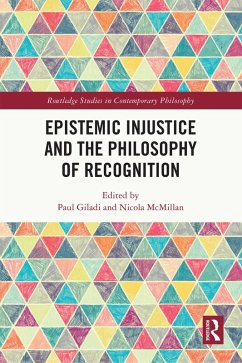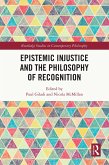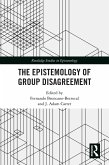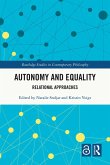Epistemic Injustice and the Philosophy of Recognition (eBook, ePUB)
Redaktion: Giladi, Paul; McMillan, Nicola
40,95 €
40,95 €
inkl. MwSt.
Sofort per Download lieferbar

20 °P sammeln
40,95 €
Als Download kaufen

40,95 €
inkl. MwSt.
Sofort per Download lieferbar

20 °P sammeln
Jetzt verschenken
Alle Infos zum eBook verschenken
40,95 €
inkl. MwSt.
Sofort per Download lieferbar
Alle Infos zum eBook verschenken

20 °P sammeln
Epistemic Injustice and the Philosophy of Recognition (eBook, ePUB)
Redaktion: Giladi, Paul; McMillan, Nicola
- Format: ePub
- Merkliste
- Auf die Merkliste
- Bewerten Bewerten
- Teilen
- Produkt teilen
- Produkterinnerung
- Produkterinnerung

Bitte loggen Sie sich zunächst in Ihr Kundenkonto ein oder registrieren Sie sich bei
bücher.de, um das eBook-Abo tolino select nutzen zu können.
Hier können Sie sich einloggen
Hier können Sie sich einloggen
Sie sind bereits eingeloggt. Klicken Sie auf 2. tolino select Abo, um fortzufahren.

Bitte loggen Sie sich zunächst in Ihr Kundenkonto ein oder registrieren Sie sich bei bücher.de, um das eBook-Abo tolino select nutzen zu können.
This volume examines the relationship between recognition theory and key developments in critical social epistemology. It explores how far certain kinds of epistemic injustice, epistemic oppression, and types of ignorance can be understood as distorted varieties of recognition.
- Geräte: eReader
- ohne Kopierschutz
- eBook Hilfe
- Größe: 4MB
Andere Kunden interessierten sich auch für
![Epistemic Injustice and the Philosophy of Recognition (eBook, PDF) Epistemic Injustice and the Philosophy of Recognition (eBook, PDF)]() Epistemic Injustice and the Philosophy of Recognition (eBook, PDF)40,95 €
Epistemic Injustice and the Philosophy of Recognition (eBook, PDF)40,95 €![The Epistemic Injustice of Genocide Denialism (eBook, ePUB) The Epistemic Injustice of Genocide Denialism (eBook, ePUB)]() Melanie AltanianThe Epistemic Injustice of Genocide Denialism (eBook, ePUB)109,95 €
Melanie AltanianThe Epistemic Injustice of Genocide Denialism (eBook, ePUB)109,95 €![Viral Critique (eBook, ePUB) Viral Critique (eBook, ePUB)]() Viral Critique (eBook, ePUB)50,95 €
Viral Critique (eBook, ePUB)50,95 €![The Epistemology of Group Disagreement (eBook, ePUB) The Epistemology of Group Disagreement (eBook, ePUB)]() The Epistemology of Group Disagreement (eBook, ePUB)33,95 €
The Epistemology of Group Disagreement (eBook, ePUB)33,95 €![Getting Our Act Together (eBook, ePUB) Getting Our Act Together (eBook, ePUB)]() Anne SchwenkenbecherGetting Our Act Together (eBook, ePUB)40,95 €
Anne SchwenkenbecherGetting Our Act Together (eBook, ePUB)40,95 €![The Epistemic Injustice of Genocide Denialism (eBook, PDF) The Epistemic Injustice of Genocide Denialism (eBook, PDF)]() Melanie AltanianThe Epistemic Injustice of Genocide Denialism (eBook, PDF)109,95 €
Melanie AltanianThe Epistemic Injustice of Genocide Denialism (eBook, PDF)109,95 €![Autonomy and Equality (eBook, ePUB) Autonomy and Equality (eBook, ePUB)]() Autonomy and Equality (eBook, ePUB)40,95 €
Autonomy and Equality (eBook, ePUB)40,95 €-
-
-
This volume examines the relationship between recognition theory and key developments in critical social epistemology. It explores how far certain kinds of epistemic injustice, epistemic oppression, and types of ignorance can be understood as distorted varieties of recognition.
Dieser Download kann aus rechtlichen Gründen nur mit Rechnungsadresse in A, B, BG, CY, CZ, D, DK, EW, E, FIN, F, GR, HR, H, IRL, I, LT, L, LR, M, NL, PL, P, R, S, SLO, SK ausgeliefert werden.
Produktdetails
- Produktdetails
- Verlag: Taylor & Francis
- Seitenzahl: 382
- Erscheinungstermin: 12. August 2022
- Englisch
- ISBN-13: 9780429787072
- Artikelnr.: 64189154
- Verlag: Taylor & Francis
- Seitenzahl: 382
- Erscheinungstermin: 12. August 2022
- Englisch
- ISBN-13: 9780429787072
- Artikelnr.: 64189154
Paul Giladi is a Senior Lecturer in Philosophy at Manchester Metropolitan University, where he is on the Steering Group of the Research Network for the Study of Race and Racism. He is also the co-director of the Naturalism, Modernity, and Civilization International Research Network. Giladi has published numerous articles in leading philosophy journals and edited collections on Hegel, pragmatism, critical social theory, feminism, and contemporary Anglo-American philosophy. He is also the editor of Responses to Naturalism: Critical Perspectives from Idealism and Pragmatism (Routledge, 2019) and the editor of Hegel and the Frankfurt School (Routledge, 2020). Nicola McMillan was awarded her PhD in philosophy at the University of Lancaster in 2017. Her thesis was awarded the 2018 Political Studies Association Sir Ernest Barker Prize for political theory. She co-edited a 2018 special issue of Feminist Philosophy Quarterly with Paul Giladi on epistemic injustice and recognition theory. McMillan now works for the National Institute of Health Research in the United Kingdom, where she currently manages Join Dementia Research, a service that supports the UK public in volunteering for dementia and brain health research.
Preface, Lucius Turner Outlaw Jr.
Introduction, Nicola McMillan
Part I: Recognition Theory and Critical Social Epistemology in Conversation
1. Axel Honneth, Two Interpretations of Social Disrespect: A Comparison
Between Epistemic and Moral Recognition
2. Danielle Petherbridge, A Fourth Order of Recognition? Accounting for
Epistemic Injustice in Recognition Theory
3. Cynthia R. Nielsen & David Utsler, Gadamer, Fricker, and Honneth:
Testimonial Injustice, Prejudice, and Social Esteem
4. Lois McNay, Recognising Disempowerment: Taking the 'Merely Experienced'
Seriously
5. Kelly Oliver, Gaslighting: Pathologies of Recognition and the Colonisation
of Psychic Space
6. Paul Giladi, Epistemic Exploitation and Ideological Recognition
7. Ezgi Sertler, Calling Recognition Bluffs: Structural Epistemic Injustice
and Administrative Violence
8. Mari Mikkola, Ideal Theory, Epistemologies of Ignorance, and
(Mis)Recognition
Part II: Making Sense of Contemporary Social-Epistemic Struggles
9. Katherine O'Donnell, Commission to Inquire into Ireland's Mother & Baby
Homes: An Epistemology of Ignorance
10. Rebecca Tsosie, Constitutional Law and Epistemic Injustice: Hate Speech,
Stereotyping, and Recognition Harm
11. Debra L. Jackson, Male Sexual Victimisation, Failures of Recognition, and
Epistemic Injustice
12. Lauren Freeman & Heather Stewart, The Problem of Recognition, Erasure, and
Epistemic Injustice in Medicine: Harms to Transgender and Gender Non-Binary
Patients - Why We Should Be Worried
13. Wendy Carlton & Katrina Hutchison, Epistemic Injustice and Misrecognition
in the Sphere of Work: The Case of Women in Surgery
Introduction, Nicola McMillan
Part I: Recognition Theory and Critical Social Epistemology in Conversation
1. Axel Honneth, Two Interpretations of Social Disrespect: A Comparison
Between Epistemic and Moral Recognition
2. Danielle Petherbridge, A Fourth Order of Recognition? Accounting for
Epistemic Injustice in Recognition Theory
3. Cynthia R. Nielsen & David Utsler, Gadamer, Fricker, and Honneth:
Testimonial Injustice, Prejudice, and Social Esteem
4. Lois McNay, Recognising Disempowerment: Taking the 'Merely Experienced'
Seriously
5. Kelly Oliver, Gaslighting: Pathologies of Recognition and the Colonisation
of Psychic Space
6. Paul Giladi, Epistemic Exploitation and Ideological Recognition
7. Ezgi Sertler, Calling Recognition Bluffs: Structural Epistemic Injustice
and Administrative Violence
8. Mari Mikkola, Ideal Theory, Epistemologies of Ignorance, and
(Mis)Recognition
Part II: Making Sense of Contemporary Social-Epistemic Struggles
9. Katherine O'Donnell, Commission to Inquire into Ireland's Mother & Baby
Homes: An Epistemology of Ignorance
10. Rebecca Tsosie, Constitutional Law and Epistemic Injustice: Hate Speech,
Stereotyping, and Recognition Harm
11. Debra L. Jackson, Male Sexual Victimisation, Failures of Recognition, and
Epistemic Injustice
12. Lauren Freeman & Heather Stewart, The Problem of Recognition, Erasure, and
Epistemic Injustice in Medicine: Harms to Transgender and Gender Non-Binary
Patients - Why We Should Be Worried
13. Wendy Carlton & Katrina Hutchison, Epistemic Injustice and Misrecognition
in the Sphere of Work: The Case of Women in Surgery
Preface, Lucius Turner Outlaw Jr.
Introduction, Nicola McMillan
Part I: Recognition Theory and Critical Social Epistemology in Conversation
1. Axel Honneth, Two Interpretations of Social Disrespect: A Comparison
Between Epistemic and Moral Recognition
2. Danielle Petherbridge, A Fourth Order of Recognition? Accounting for
Epistemic Injustice in Recognition Theory
3. Cynthia R. Nielsen & David Utsler, Gadamer, Fricker, and Honneth:
Testimonial Injustice, Prejudice, and Social Esteem
4. Lois McNay, Recognising Disempowerment: Taking the 'Merely Experienced'
Seriously
5. Kelly Oliver, Gaslighting: Pathologies of Recognition and the Colonisation
of Psychic Space
6. Paul Giladi, Epistemic Exploitation and Ideological Recognition
7. Ezgi Sertler, Calling Recognition Bluffs: Structural Epistemic Injustice
and Administrative Violence
8. Mari Mikkola, Ideal Theory, Epistemologies of Ignorance, and
(Mis)Recognition
Part II: Making Sense of Contemporary Social-Epistemic Struggles
9. Katherine O'Donnell, Commission to Inquire into Ireland's Mother & Baby
Homes: An Epistemology of Ignorance
10. Rebecca Tsosie, Constitutional Law and Epistemic Injustice: Hate Speech,
Stereotyping, and Recognition Harm
11. Debra L. Jackson, Male Sexual Victimisation, Failures of Recognition, and
Epistemic Injustice
12. Lauren Freeman & Heather Stewart, The Problem of Recognition, Erasure, and
Epistemic Injustice in Medicine: Harms to Transgender and Gender Non-Binary
Patients - Why We Should Be Worried
13. Wendy Carlton & Katrina Hutchison, Epistemic Injustice and Misrecognition
in the Sphere of Work: The Case of Women in Surgery
Introduction, Nicola McMillan
Part I: Recognition Theory and Critical Social Epistemology in Conversation
1. Axel Honneth, Two Interpretations of Social Disrespect: A Comparison
Between Epistemic and Moral Recognition
2. Danielle Petherbridge, A Fourth Order of Recognition? Accounting for
Epistemic Injustice in Recognition Theory
3. Cynthia R. Nielsen & David Utsler, Gadamer, Fricker, and Honneth:
Testimonial Injustice, Prejudice, and Social Esteem
4. Lois McNay, Recognising Disempowerment: Taking the 'Merely Experienced'
Seriously
5. Kelly Oliver, Gaslighting: Pathologies of Recognition and the Colonisation
of Psychic Space
6. Paul Giladi, Epistemic Exploitation and Ideological Recognition
7. Ezgi Sertler, Calling Recognition Bluffs: Structural Epistemic Injustice
and Administrative Violence
8. Mari Mikkola, Ideal Theory, Epistemologies of Ignorance, and
(Mis)Recognition
Part II: Making Sense of Contemporary Social-Epistemic Struggles
9. Katherine O'Donnell, Commission to Inquire into Ireland's Mother & Baby
Homes: An Epistemology of Ignorance
10. Rebecca Tsosie, Constitutional Law and Epistemic Injustice: Hate Speech,
Stereotyping, and Recognition Harm
11. Debra L. Jackson, Male Sexual Victimisation, Failures of Recognition, and
Epistemic Injustice
12. Lauren Freeman & Heather Stewart, The Problem of Recognition, Erasure, and
Epistemic Injustice in Medicine: Harms to Transgender and Gender Non-Binary
Patients - Why We Should Be Worried
13. Wendy Carlton & Katrina Hutchison, Epistemic Injustice and Misrecognition
in the Sphere of Work: The Case of Women in Surgery







